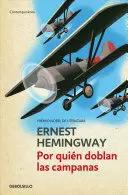
HEMINGWAY, ERNEST
En los tupidos bosques de pinos de una región montañosa española, un grupo de milicianos se dispone a volar un puente esencial para la ofensiva republicana. La acción cortará las comunicaciones por carretera y evitará el contraataque de los sublevados. Robert Jordan, un joven voluntario de las Brigadas Internacionales, es el dinamitero experto que ha vendido a España para volar dicho puente. Allí, en las montañas, descubrirá los peligros y la intensa camaradería de la guerra. Y d escubrirá también a María, una joven rescatada por los milicianos de manos de las fuerzas sublevadas de Franco, de la cual se enamorará enseguida. Mientras atraviesan las montañas, Robert Jordan irá conociendo lo sucedido durante los primeros días de la sublevación hasta el momento en que se precipite la tragedia colectiva en que están inmersos. u003cpu003eu003ciu003ePor quién doblan las campanasu003c/iu003e es la novela que le dio a Hemingway lo mejor y lo peor que puede recibir alguien con mentalidad de atleta: un triunfo insuperable.u003cbru003eu003ciu003eJuan Villorou003c/iu003e u003cpu003eu003cbu003eENGLISH DESCRIPTIONu003cbru003eNobel Prize Winner 1954 In 1937 Ernest Hemingway traveled to Spain to cover the civil war there for the North American Newspaper Alliance. Three years later he completed the greatest novel to emerge from the good fight, For Whom the Bell Tolls.u003cbru003eu003c/bu003eThe story of Robert Jordan, a young American in the International Brigades attached to an antifascist guerilla unit in the mountains of Spain, it tells of loyalty and courage, love and defeat, and the tragic death of an ideal. In his portrayal of Jordan's love for the beautiful Maria and his superb account of El Sordo's last stand, in his brilliant travesty of La Pasionaria and his unwillingness to believe in blind faith, Hemingway surpasses his achievement in The Sun Also Rises and A Farewell to Arms to create a work at once rare and beautiful, strong and brutal, compassionate, moving, and wise. If the function of a writer is to reveal reality, Maxwell Perkins wrote Hemingway after reading the manuscript, no one ever so completely performed it. Greater in power, broader in scope, and more intensely emotional than any of the author's previous works, it stands as one of the best war novels of all time.